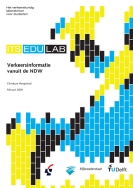The traffic information provision in The Netherlands will experience quit drastic changes in the coming years. This stems from the fact that the ‘Nationale Databank Wegverkeersgegevens’ (NDW, national data warehouse for traffic data) will become operational. The NDW will become the databank that will collect, process, store and distribute all relevant traffic data. Road authorities and external providers (commercial parties) provide traffic data to the NDW. Traffic data will not only be collected on important highways (which is the case nowadays), but also on regional roads and urban roads. The NDW does not indicate the method of gathering traffic data, but the data has to satisfy functional specifications with quality requirements and standards. These functional specifications refer to four traffic variables: traffic flow, realized travel times, actual travel times and speeds.
The research described in this report was focused on the consequences of the functional specifications of the NDW for the provision and use of traffic information. It turned out that the consequences of the functional specifications lies in the fact that they determine the degree of knowledge of the traffic situation in the network. Because of that they affect the quality of the traffic information (since traffic information is based on that knowledge). When road users are in the know of the situation in the network quit well, they are able to choose an efficient route. So the functional specifications affect the effect of traffic information as well. The most important recommendations based on this research are to guarantee the actuality, to be aware of a change in network load due to traffic information provision (especially with respect to the mentioned stability problem related to the appreciation of traffic information), and to do expanding research with respect to incidental circumstances.
